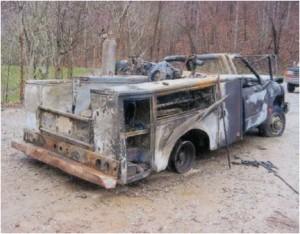BACKGROUND: Two logging company employees were leaving the woods after working half a day on a Saturday morning. It was a mild early spring day in the Appalachians.
PERSONAL CHARACTERISTICS: The 31-year-old driver of the truck was the owner’s son-in-law, and he served as the foreman when the owner was off-site. He had been logging for five years, with no prior accidents.
UNSAFE ACT OR CONDITIONS: The utility truck was heavily loaded with a welder, air compressor, fuel tank, fuel cans, chain saws, and tools. The truck was undersized for the amount of equipment it was hauling, resulting in improper placement and storage of equipment. The bed of the truck was moist with fuel and grease.
ACCIDENT: As the employees were driving away from the logging site, the driver saw in his mirror that the bed of the truck was on fire. The fire quickly spread out of control. Concerned that the acetylene tanks, diesel tank, or gas cans in the truck might explode, both men left the truck and contacted a local fire department. Although it isn’t certain what caused the fire, the driver’s theory was that either a metal gas can or metal tools contacted the starter on the welder, which arced and started a fire with the fuel and grease on the bed of the truck.
INJURY: Neither employee was injured, but the truck and its contents were destroyed. The truck was insured, but the contents were not. Thousands of dollars worth of equipment was lost, including all of the company’s tools and chain saws.
RECOMMENDATIONS FOR CORRECTION:
- Be certain that any batteries or electrical equipment cannot come in contact with other tools or fuel.
- Keep adequate fire extinguishers on all pieces of equipment and in each vehicle, and inspect them monthly.
- Do not overload a light-duty truck.
- Consider insuring all equipment, and keep records of company-owned equipment.
Courtesy of the Forest Resources Association: https://www.forestresources.org/

